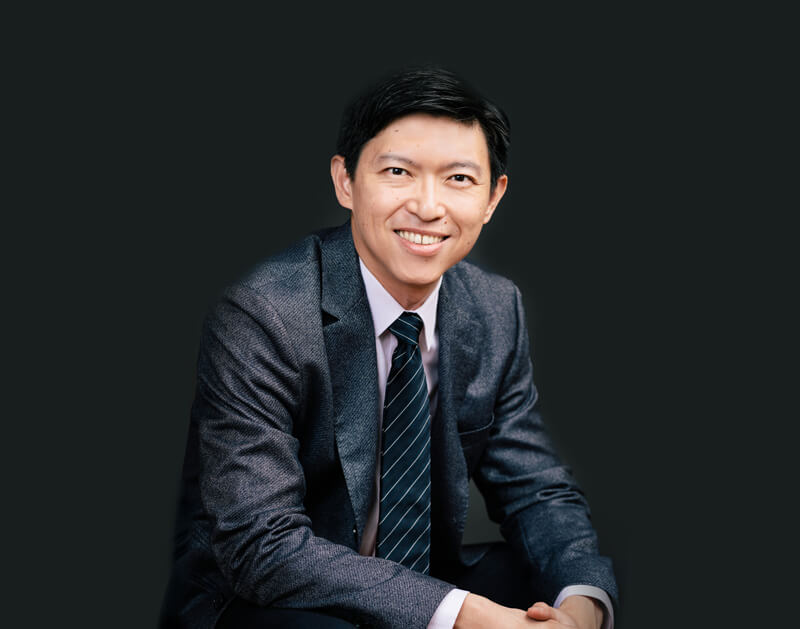(Ask for Dr Ong)

DR. ONG KEE LEONG
Wrist and Hand Injuries
The wrist is a complex joint that bridges the hand to the forearm. It is actually a collection of multiple bones and joints. The anatomy of the hand is complex, intricate, and fascinating. Its integrity is absolutely essential for our everyday functional living.
Book AppointmentAccompanying Symptoms of Wrist Injuries
Injury to any part of this complex joint can result in pain and affect your range of motion in your wrist and hand. More often than not, wrist injuries present itself with the following symptoms:
- Difficulty making a fist
- Limited range of motion in the wrist
- Warm sensation near the wrist
- Pins-and-needles or a tingling sensation
- Sudden pain attacks
- A fever, in addition to redness, pain and swelling in your wrist
If your wrist or hand pain is affecting your quality of life and you cannot perform everyday activities, it is highly advisable to see an orthopaedic specialist for a detailed diagnosis and advice.


Causes of Wrist and Hand Pain
Injuries
Wrist injuries often present in the form of sprains or fractures, which often occur when you break a fall on your hands. They can also occur as a result of repetitive movements and stress to your wrist. These movements can range from playing racquet sports, to typing with the wrong posture or even bowing string instruments. Repetitive movements can cause inflammation to tissues around your wrist joint, especially if you perform the movement for long periods of time without breaks.
Arthritis
Osteoarthritis
Osteoarthritis is a degenerative disease that occurs as one ages due to the wear and tear of the joints. It could also be related to lifestyle activities that you partake in, or due to previous injuries to the wrist. This is the most common form of arthritis.
Osteoarthritis often affects individuals over the age of 50 but sometimes, younger people may be affected as well.
Rheumatoid Arthritis
Rheumatoid Arthritis is an inflammatory form of arthritis. It presents as an autoimmune disease in which the body’s immune system attacks the joint.
In these autoimmune cases, the disease can be managed with medication but can rarely be cured, and may eventually become irreversibly damaged.
Gout
Gout is a common form of inflammatory arthritis that can be very painful. It is caused by the formation of crystals within the joints, causing swelling and inflammation of the joints.
It is often characterised by very sudden, severe attacks of pain, swelling and tenderness in the joints. It usually affects one joint each time (often the big toe joint).
Carpal Tunnel Syndrome
Carpal tunnel syndrome occurs when there is increased pressure on the median nerve as it passes through a passage in your wrist called the carpal tunnel. The median nerve controls the movement and feeling of all your fingers, except the last finger. The carpal tunnel syndrome may cause numbness, weakness, or a tingling sensation in your hand.
De Quervain’s Tenosynovitis
De Quervain’s Tenosynovitis is a common condition which causes pain on the wrist joint on the same side of the thumb. It is due to inflammation usually from wrist overuse, resulting in tightening of a tunnel that houses 2 important tendons that move the thumb.
This results in pain upon movements of the thumb and the wrist, resulting in limited range of motion. Common scenarios where this happens are patients who work with a keyboard/mouse for long periods, chefs who carry trays of food and even perhaps first time parents who are experiencing the joys of carrying and cradling their baby.
Trigger Fingers
Trigger fingers commonly afflicts patients who tend to make repetitive movements with their fingers. These include patients who type frequently or do significant amount of household chores such as washing and wringing dry laundry.
The affected fingers have a stuttering movement associated with pain and in severe conditions, can be completely stuck. The thumb may also be affected in the same way.
Medisave & Insurance Shield Plan Approved
For Singaporeans & Singapore Permanent Residents
Treatments for Wrist and Hand Pain
Non-Surgical Options
Physical therapy
Physiotherapy is the treatment of injury and disease using noninvasive techniques. It focuses on improving your ability to move and function without pain, boosting your quality of life.
Exercises performed during a physiotherapy session aids in the strengthening of your wrist muscles to help you improve the mobility of your wrist. The goal is to improve strength, increase endurance and to improve range of motion. It also helps to reduce the likelihood of future injuries.
Occasionally, a lightweight splint may be used to provide comfort while allowing the condition to heal.
Medications
Medications and pain relievers can help reduce inflammation and ease your discomfort while managing the disease but are often not the best long-term solution.
When appropriate, certain conditions such as Trigger Fingers and De Quervain’s Tenosynovitis may benefit from a steroid injection to reduce inflammation and pain.
Surgical Options
If your wrist is severely affected and your symptoms persist even after non-surgical interventions, your doctor may recommend surgical options as an alternative to treat your wrist.
Over time, conditions like carpal tunnel syndrome can affect and weaken your wrist muscles severely. If symptoms persist, your condition may worsen and non-surgical interventions may not be sufficient to manage the condition. Do consult your doctor to know your treatment options.
Why Do Patients Choose Dr Ong Kee Leong?
- Dr. Ong Is Passionate In Sports, Giving Him A Deep Understanding Of Sports-Related Injuries And How They Can Be Treated
- Personalised And Professional Approach To Deliver High-Quality Orthopaedic Care Based On The Most Up-To-Date Literature
- Detailed Aftercare Plan To Ensure Smooth, Long-Term Recovery
- Fellowship Trained Surgeon With 15 Years Of Experience In Orthopaedic Conditions
- Problem-Oriented, Well-Organised and Individualized Treatment Plans Catered To Your Specific Needs
- Specialist In The Management Of Sports Injuries And Degenerative Conditions Of The Shoulder And Knee Joints
- Knowledgeable And Pleasant Clinical Staff To Assist You With Your Every Need Detailed Aftercare Plan To Ensure
- Our Care Is Conveniently Accessible At Mount Elizabeth Novena and Farrer Park Hospital
- Minimal Waiting Time For Initial Consultation
- Assistance With Medical Claims (e.g. Medisave & Integrated Shield Plans)
“At our clinic, we generally try to explore non-surgical treatment such as activities modification, physiotherapy and orthotics before recommending invasive intervention options.”
Why Choose Us
-
Fellowship Trained Orthopaedic Surgeon
Dr. Ong is fellowship trained with 15 years of experience in orthopaedic conditions, with a subspecialty in the management of sports injuries and degenerative conditions of the shoulder and knee joints. Dr. Ong uses a personal and professional approach to deliver high-quality care, based on the most up-to-date medical literature.
-
Passionate About Sports Medicine
Dr. Ong Is Passionate In Sports, Giving Him A Deep Understanding Of Sports-Related Injuries And How They Can Be Treated
-
Advanced Treatments
Our treatment plans are problem-oriented, well organised and personalised, catering to each of your specific needs. We are also committed to seeing you through to recovery, where individualized aftercare plans are designed to ensure a smooth and long-term recovery.
-
Fast Recovery
Our individualized treatment plans are designed to treat the cause of your injury quickly. We are passionate about getting you back in the game, and staying in the game. Our team is fully committed to returning you to the life and activities you love.
About Dr. Ong Kee Leong
Senior Consultant, MBBS (Singapore), MMed (Ortho), FRCSEd (Ortho)
Dr. Ong Kee Leong is a fellowship-trained orthopaedic surgeon. He subspecializes in shoulder and knee, foot and ankle, hand wrist and elbow surgeries, arthroscopic sports surgery, and the management of sports-related injuries.
He has been registered with the Singapore Medical Council as a specialist in Orthopaedic Surgery since 2011.
- MBBS, National University of Singapore (NUS) Faculty of Medicine 2001
- Member of the Royal College of Surgeons of Edinburgh 2007
- Master of Medicine in Orthopaedic Surgery (NUS) 2007
- Fellow of the Royal College of Surgeons of Edinburgh in Orthopaedic Surgery 2011
- Health Manpower Development Plan (HMDP) Scholarship, Ministry of Health 2012-2013:
- Sports Surgery and Arthroscopy in Germany (Hannover)
- Adjunct Assistant Professor, Lee Kong Chian School Of Medicine, Nanyang Technological University
- Senior Clinical Lecturer, Yong Loo Lin School of Medicine, NUS
Awards & Teaching
- Dr. Ong had received numerous awards such as Best Service and Eastern Health Alliance Caring (Gold) Awards.
- He also has an interest in clinical research and has written papers in multiple peer-review journals. As a Core Faculty of Singhealth Orthopaedic Surgery Residency Program, he oversees the training of junior orthopaedic surgeons.
- Regularly invited to teach local and regional surgeons in Shoulder and Knee Surgery Courses.
- He is a recipient of multiple teaching awards including the Singhealth Residency Outstanding Faculty Awards from 2014-2016 and Changi General Hospital Outstanding Educator Awards 2015-2016.
Frequently Asked Questions
What Is The Cause Of My Wrist Pain?
The wrist is a complex joint that bridges the hand to the forearm. It is actually a collection of multiple bones and joints.
Wrist pain is commonly a result of carpal tunnel syndrome. Other common reasons include sprains or fractures from injuries, arthritis or gout.
If your wrist pain is severe, visiting an Orthopaedic specialist is the best way forward to get an accurate diagnosis and treatment.
Is My Wrist / Hand Pain Serious Enough For A Visit To A Specialist Orthopaedic Surgeon?
When your wrist or hand pain becomes more persistent, the treatment options may be beyond your GP’s expertise.
You should seek specialist medical advice from an orthopaedic surgeon if you experience any of the following:
When wrist/hand pain occurs over a long period
If any parts of the wrist, including the bones, ligaments, or tendons, become injured, it can lead to wrist pain that could last longer.
Limited ability to move your wrist/hand
If you have severe pain, deformity, numbness, or are unable to move your wrist/hand, you should call your doctor for an immediate appointment or go to an urgent care clinic.
If your wrist or hand pain is affecting your quality of life and you cannot perform everyday activities, it is highly advisable to see an orthopaedic surgeon for a detailed diagnosis and advice.
What Can I Expect At My First Visit With An Orthopaedic Surgeon?
At your first appointment with Dr. Ong, he will evaluate your medical history and the pain you are experiencing.
Depending on the symptoms you have, he will likely perform some form of diagnostic imaging (e.g. X-Rays or MRI scans) to assess your condition accurately. X-rays and CT scans are useful to rule out bony problems, whilst an MRI scan is excellent at looking at soft tissue (e.g. tendons, ligaments, cartilage) problems.
After assessing your condition, Dr. Ong will recommend a personalised treatment plan, according to your specific needs. This may include surgical or non-surgical treatment options.
Will I Need Surgery To Treat My Wrist or Hand Pain?
After diagnosis, Dr. Ong will advise an individualised treatment plan that is customized to your specific needs. The treatment plan varies from patient to patient, and the condition you have.
For less severe problems, Dr. Ong may recommend a non-surgical management plan (such as painkillers and physiotherapy) to treat your condition initially. If your symptoms do not improve or even worsen over the course of this treatment, Dr. Ong will review the treatment protocol and may advise surgery.
Dr. Ong will only recommend surgical options when all other conventional non-surgical interventions have failed, or if non-surgical options will not work for your condition. For example, if you have a broken bone which is extremely painful and debilitating, you may benefit from immediate surgery.
What Modes Of Payments Do You Accept?
Consultation fees are charged based on length of consultation, and start from SGD 150 (within 30 minutes).
We accept the following modes of payment:
- Cash
- NETS
- PayNow & PayLah!
- All major Credit Cards
If you are insured and would like to use E-Filing or A Letter of Guarantee (LOG) from the major insurers in Singapore, please contact us, our friendly clinic staff will assist you and provide more information if required.
Have an enquiry about your condition or a certain treatment?
Fill up the form and we will get back to you soon!
Make An Enquiry
Prefer to talk? Call our clinic directly to make an enquiry at (65) 6884 6788
(Please ask for Dr Ong Kee Leong)
our clinics
Visit Us Today
Mt Elizabeth Novena
- 38 Irrawaddy Road #06-59/60/61 Mt Elizabeth Novena Specialist Centre Singapore 329563
- klong@sog.sg
- (65) 6884 6788
- (Ask for Dr Ong)
- (65) 9652 5022
-
Mon – Fri : 9:00 am – 5:00 pm
Sat : 9:00 am – 1:00 pm
other practice locations
Farrer Park Hospital
- 1 Farrer Park Station Road #14-06 Connexion Singapore 217562
- klong@sog.sg
- (65) 6884 6788
- (Ask for Dr Ong)
- (65) 9652 5022
-
Mon – Fri : 9:00 am – 5:00 pm
Sat : 9:00 am – 1:00 pm
Mt Alvernia Medical Centre
- 820 Thomson Road #07-53 Mt Alvernia Medical Centre D Singapore 574623
- klong@sog.sg
- (65) 6884 6788
- (Ask for Dr Ong)
- (65) 9652 5022
-
Mon – Fri : 9:00 am – 5:00 pm
Sat : 9:00 am – 1:00 pm
Your Treatment Roadmap With Dr. Ong Kee Leong
Registration
Our friendly clinical staff will assist you with your registration, ensuring an efficient and hassle-free process for you.
Specialist Consultation
During your consultation, Dr. Ong will evaluate your medical history and the pain you are experiencing. You may also ask Dr. Ong any questions you may have about your condition.
Diagnosis Of Your Condition
Dr. Ong will likely perform some form of diagnostic imaging (e.g. X-Rays or MRI scans) to assess your condition accurately.
Treatment For Your Condition
After imaging, Dr. Ong will review the results of your scans thoroughly with you, and advise an individualised treatment plan just for you.
Follow Up Visits With Dr Ong
As you go through your treatment plan, Dr. Ong will follow up with you every step of the way, ensuring that you receive the dedicated care you deserve.
"Moving your body the way nature intended is a freedom not well appreciated until it is lost. We are passionate about getting you back in the game, and staying in the game. Our team is fully committed to returning you to the life and activities you love."
Billing & Payment
Consultation fees are charged based on length of consultation, and start from SGD$150 (within 30 minutes).
Modes of Payment
We accept the following modes of payment:
- Cash
- PayNow & PayLah
- All major Credit Cards
If you are insured and would like to use a Letter of Guarantee (LOG) from the major insurers in Singapore, please contact us and our friendly clinic staff will assist you and provide more information if required.
Can I Claim Through My Medisave Account? (For Singaporeans and PR)
Yes, you can. Our Clinic is an accredited day surgery clinic by the Ministry of Health. Singaporeans and Permanent Residents may use their Medisave for eligible orthopaedic inpatient procedures and hospitalizations.
The exact amount would depend on the complexity of the procedure. If you have any enquiries, feel free to speak to our friendly clinic staff about using your Medisave account.
Integrated Shield Plans (Singaporeans and PRs)
Yes, patients who have purchased Integrated Shield plans with riders for co-insurance and deductibles will be able to use them in our clinic for eligible procedures. For more information, contact us to find out if your procedure is claimable.
The 6 Approved Integrated Shield Insurers are:
- NTUC Income’s IncomeShield and Enhanced IncomeShield
- American International Assurance International Co’s (AIA) HealthShield Gold
- Great Eastern Life Assurance Co’s SupremeHealth and SupremeHealth Plus
- Aviva Ltd’s MyShield
- Prudential Assurance Co’s PRUShield
- AXA Shield
Have an enquiry about your condition or a certain treatment?
Fill up the form and we will get back to you soon!
Make An Enquiry
Prefer to talk? Call our clinic directly to make an enquiry at (65) 6884 6788
(Please ask for Dr Ong Kee Leong)
our clinics
Visit Us Today
Mt Elizabeth Novena
- 38 Irrawaddy Road #06-59/60/61 Mt Elizabeth Novena Specialist Centre Singapore 329563
- klong@sog.sg
- (65) 6884 6788
- (65) 9652 5022
-
Mon – Fri : 9:00 am – 5:00 pm
Sat : 9:00 am – 1:00 pm
Frequently Asked Questions
-
Is My Condition Serious Enough For A Visit To A Specialist Orthopaedic Surgeon?
When specific conditions become more chronic and persistent, the treatment options may be beyond your GP’s expertise.
If you experience severe pain, or if your pain is affecting your quality of life such that you cannot perform everyday activities normally (e.g. walking, standing or wearing clothes), visiting an Orthopaedic Surgeon for a detailed assessment and diagnosis is the best course of action.
-
What Can I Expect At My First Visit With An Orthopaedic Surgeon?
At your first appointment with Dr. Ong, he will evaluate your medical history and the pain you are experiencing.
Depending on the symptoms you have, he will likely perform some form of diagnostic imaging (e.g. X-Rays or MRI scans) to assess your condition accurately. X-rays and CT scans are useful to rule out bony problems, whilst an MRI scan is excellent at looking at soft tissue (e.g. tendons, ligaments, cartilage) problems.
After assessing your condition, Dr. Ong will recommend a personalised treatment plan, according to your specific needs. This may include surgical or non-surgical treatment options.
-
Can I Continue My Sporting Activities If I Am Experiencing Pain (e.g. Shoulder, Knee or Hip Pain)?
Dr. Ong always advises patients to listen to their bodies and not push through the pain barrier, especially if your pain is a direct result of sports injuries.
If your pain does not subside with RICE (rest, ice, compression and elevation) and over-the-counter painkillers, it is highly advisable that you seek professional medical advice. Continuing with sporting activities will place additional strain on your body and worsen the condition.
-
Will I Need Surgery To Treat My Pain?
After diagnosis, Dr. Ong will advise an individualized treatment plan that is customized to your specific needs. The treatment plan varies from patient to patient, and the condition you have.
For less severe problems, Dr. Ong may recommend a non-surgical management plan (such as painkillers and physiotherapy) to treat your condition initially. If your symptoms do not improve or even worsen over the course of this treatment, Dr. Ong will review the treatment protocol and may advise surgery.
Dr. Ong will only recommend surgical options when all other conventional non-surgical interventions have failed, or if non-surgical options will not work for your condition. For example, if you have a broken bone which is extremely painful and debilitating, you may benefit from immediate surgery.
-
What Modes Of Payments Do You Accept?
Consultation fees are charged based on length of consultation, and start from SGD$150 (within 30 minutes).
We accept the following modes of payment:
- Cash
- Paynow & Paylah
- All major Credit Cards
If you are insured and would like to use E-Filing or A Letter of Guarantee (LOG) from the major insurers in Singapore, please contact us, our friendly clinic staff will assist you and provide more information if required.
-
Can I Claim Through My Medisave Account? (For Singaporeans and PR)
Yes, you can. Our Clinic is an accredited day surgery clinic by the Ministry of Health. Singaporeans and Permanent Residents may use their Medisave for consultations, eligible orthopaedic procedures and medications at our clinic.
The exact amount would depend on the complexity of the procedure. If you have any enquiries, feel free to speak to our friendly clinic staff about using your Medisave account.

